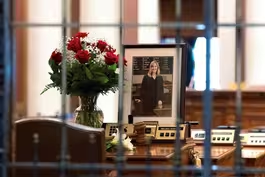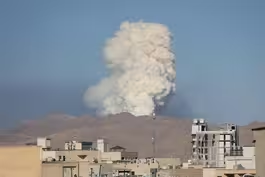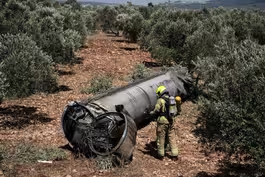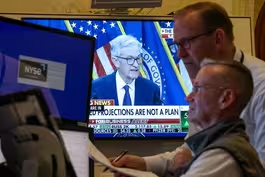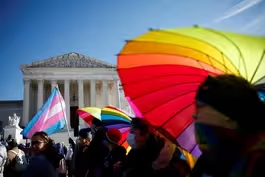
Homeland Security official on Trump's immigration policy
Clip: 6/18/2025 | 9m 28sVideo has Closed Captions
Homeland Security official on the Trump administration's immigration policy changes
As the Trump administration continues to escalate immigration enforcement operations around the country, Amna Nawaz speaks with Tricia McLaughlin, assistant secretary for public affairs for the Department of Homeland Security, to learn more.
Problems playing video? | Closed Captioning Feedback
Problems playing video? | Closed Captioning Feedback
Major corporate funding for the PBS News Hour is provided by BDO, BNSF, Consumer Cellular, American Cruise Lines, and Raymond James. Funding for the PBS NewsHour Weekend is provided by...

Homeland Security official on Trump's immigration policy
Clip: 6/18/2025 | 9m 28sVideo has Closed Captions
As the Trump administration continues to escalate immigration enforcement operations around the country, Amna Nawaz speaks with Tricia McLaughlin, assistant secretary for public affairs for the Department of Homeland Security, to learn more.
Problems playing video? | Closed Captioning Feedback
How to Watch PBS News Hour
PBS News Hour is available to stream on pbs.org and the free PBS App, available on iPhone, Apple TV, Android TV, Android smartphones, Amazon Fire TV, Amazon Fire Tablet, Roku, Samsung Smart TV, and Vizio.
Providing Support for PBS.org
Learn Moreabout PBS online sponsorshipAMNA NAWAZ: As the Trump administration continues to escalate immigration enforcement operations around the country, we're joined now by Tricia McLaughlin.
She's the assistant secretary for public affairs at the Department of Homeland Security.
Tricia, welcome to the "News Hour."
Thanks for joining us.
TRICIA MCLAUGHLIN, Assistant U.S. Secretary of Homeland Security: Amna, thank you for having me.
AMNA NAWAZ: So, I just want to ask you first about some reports about Secretary Noem being hospitalized yesterday after suffering an allergic reaction.
What can you tell us today about how she's doing?
TRICIA MCLAUGHLIN: She's doing well, Amna.
Thank you for asking.
She was discharged from the hospital last night.
And she's doing well recovering.
We just brought her to the hospital out of an abundance of caution.
AMNA NAWAZ: Thank you for that update.
I do want to turn now to what we have seen in a lot of headlines, what I know is a priority for this president, and seeing through his pledge of mass deportations.
We saw the president on Thursday say that business leaders from agriculture and hotel and leisure had expressed worries to him that your immigration policy was -- quote -- "taking very good longtime workers away from them," impacting their businesses.
In the day since, we have seen reports, of course, that ICE agents have continued to carry out raids on some of those businesses and agriculture and hotels and restaurants.
Can you just clarify what the policy is?
Despite the president's concerns that he raised, are those raids on those businesses still being carried out?
TRICIA MCLAUGHLIN: Absolutely, Amna.
And just to clarify this, our number one concern is violent criminals.
And part of the ways that we find these violent criminals is through these worksite enforcement actions.
That very much is the cornerstone of our operations.
Actually, most recently, in Los Angeles, we had an operation where we did locate multiple drug traffickers.
We're finding that these worksite enforcement oftentimes find human traffickers.
Labor traffickers are otherwise exploiting these migrants for cheap labor, unsafe working conditions.
So those are not on pause.
Those will continue.
AMNA NAWAZ: So we do know that undocumented workers make up somewhere between 4 percent and 5 percent of our entire nation's work force.
If these business leaders express concern about their businesses being impacted, are you saying there will not be a change to that policy?
TRICIA MCLAUGHLIN: I'm saying that, in the last 100 days, under this administration, 75 percent of those immigrants that we have arrested, those illegal immigrants that we have arrested, have had prior criminal convictions.
So these are not necessarily innocent individuals that they not only are in this country illegally, but they also have crimes that they have committed.
AMNA NAWAZ: I want to ask you about that number more deeply in a moment.
But just to clarify, no change to that policy coming, correct?
TRICIA MCLAUGHLIN: No, we will continue worksite enforcement operations.
AMNA NAWAZ: OK, there was this reported target of 3,000 arrests a day that we'd seen.
Can you tell me how often that target has been hit by ICE agents?
TRICIA MCLAUGHLIN: Our ICE enforcement officers, they're consistently meeting their numbers.
We want to get those numbers up, though, especially for violent criminals.
But, Amna, I think, more than that, we have to look at the culture that has been for the last four years.
Our ICE enforcement officers have been demonized.
They're facing a 413 percent increase in assaults against them.
But for the last four years, they were told, don't do your job, don't make these arrests.
So we have had to have some leadership changes.
We have had to really reinvigorate this organization, so they're empowered to do their job to make these arrests.
AMNA NAWAZ: Have they been able to hit that 3,000 target on any day so far?
TRICIA MCLAUGHLIN: Well, they're absolutely working toward it.
We're around 260,000 arrests since the Trump administration started.
AMNA NAWAZ: So, 260,000 arrests.
I want to ask you more about that, because there was a recent analysis that The Guardian did that found that, among the surge of immigrant arrests that we have seen under this Trump administration, the biggest increase from January to June was actually among people who had no charges or convictions at all, an 807 percent increase.
There were absolutely people who had criminal records and criminal convictions among those arrested, but the vast majority, the analysis, shows did not.
Is that accurate, based on what you have seen?
TRICIA MCLAUGHLIN: That's not accurate.
I would not rely on The Guardian for any sort of analysis here.
This is the federal government.
The Department of Homeland Security is telling the American people that 75 percent of those illegal aliens who have been arrested have prior convictions.
The Guardian is by no means a reliable analysis for this kind of data.
AMNA NAWAZ: You're saying 75 percent of over the 260,000 people you have arrested were convicted in a court for a violent crime?
Is that what you're saying?
TRICIA MCLAUGHLIN: That's correct.
AMNA NAWAZ: Can I just add, there's such a gap between the numbers that you're sharing right now and what we have seen in previous reports.
There was another analysis, based on internal data that CNN ran and published on June 16, that found that less than 10 percent of about 190,000 or so people who've been booked into ICE custody had been convicted of those serious violent crimes, as you mentioned.
Why is there such a huge gap between what reporters and journalists are reporting, based on the data they see, and what you're saying now?
TRICIA MCLAUGHLIN: I don't know where CNN or the Guardian are getting their data, but I wouldn't say that those are exactly nonpartisan outlets.
I don't really rely on them for facts or analysis.
I do rely on the Department of Homeland Security and our career civil servants, who are giving us this data.
AMNA NAWAZ: I do need to ask you about another trend we have seen, which is the ramping up of arrests in immigration hearings or in federal courthouses.
There was a case in San Diego last week of a man named Sayed Naser.
He worked with U.S. troops in Afghanistan.
He was arrested by ICE as he left his asylum hearing at a courthouse.
His lawyer says that he was legally paroled into the U.S., he had no criminal record in the U.S. or in Afghanistan.
And his life is surely going to be at risk if he's deported back to that country.
How is the U.S. safer without him here?
TRICIA MCLAUGHLIN: Yes, Amna, we actually looked into this case.
And, actually, we were working with the Pentagon and found that there was actually no verifiable information or data that he did work with the U.S. government while he was in Afghanistan.
But I think fortunately our message to those who are in this country illegally or have their temporary protected status that has ended is that the U.S. taxpayer so generously is offering these individuals $1,000 and a free flight home.
They preserve the option then to return to this country the legal, right way.
And if not, we will have to arrest them and deport them.
AMNA NAWAZ: This is someone that his lawyer said was legally paroled into the U.S., though.
He did legally enter.
He was following the legal process by showing up for this asylum hearing.
So why should he be deported?
TRICIA MCLAUGHLIN: So there are a number of programs that the Biden administration administered, really allowed people unvetted into this country.
We have given people the proper amount of time to leave this country or apply for asylum.
That's still on the table.
If this individual wants to apply for asylum, and he has a legitimate fear, that's something we will absolutely consider.
AMNA NAWAZ: But, Tricia, this is someone who did apply for asylum.
His case is already being heard.
Why not allow it to go through the court system before arresting and deporting?
TRICIA MCLAUGHLIN: We are allowing it to go through the court system, Amna.
AMNA NAWAZ: He's already been taken into ICE detention and put into expedited removal.
His case is not... TRICIA MCLAUGHLIN: While he's awaiting the court -- while he's awaiting his asylum hearing, that's correct.
AMNA NAWAZ: So you're saying his case will be fully heard, he won't be deported until his asylum hearing is done?
TRICIA MCLAUGHLIN: Yes, absolutely, Amna.
His case will be heard.
AMNA NAWAZ: Among the ramp-up of people we have seen arrested at some of the immigration hearings, we have heard concerns from folks who say, look, these are people going through the legal process.
They are following the rules.
Is the message that you're sending to them now, don't show up at the courthouse, don't follow the rules and follow the legal process because you might be arrested anyway?
TRICIA MCLAUGHLIN: Of course not.
But, Amna, we have spent about 10 minutes right now defending those who are here in this country illegally.
But I haven't heard a single time you talk about a victim of MS-13 or Tren de Aragua, of the 100,000 individuals in this country who die every single year of fentanyl.
So I do think something that's going on with PBS, the public broadcasting stations in this country, including cable news as well, is that there's a major focus on those who are here illegally in this country and not the victims.
And there's a reason why the American people voted in a landslide on November 5, 2024, for mass deportations.
That's what Donald Trump as a candidate promised.
And that's what we're going to deliver in this administration.
AMNA NAWAZ: Tricia, we have covered, I should point out, a number of those stories, and we will continue to do so.
I'm asking you about some of the changes in policies and enforcement actions that we have seen under this administration.
It's not a defense of anyone.
It's questions based on what we have seen in the headlines.
So, I guess the question, again, is, in terms of these enforcement actions we have seen at immigration hearings, regardless of where people are in that legal process, you're saying, if they are here without legal status, they could be arrested and deported?
Is that right?
TRICIA MCLAUGHLIN: They could be arrested and deported, especially if you have been here less than two years.
You are eligible for expedited removal.
We encourage you to go to your immigration hearing, or else you will absolutely get a final deportation order and you will be arrested and deported.
AMNA NAWAZ: Tricia, we thank you so much for making the time, being willing to come on and engage and take the questions.
That is Tricia McLaughlin, assistant secretary for public affairs at the Department of Homeland Security.
Thank you again.
TRICIA MCLAUGHLIN: Amna, thank you for having me.
AMNA NAWAZ: After the interview, we asked the HHS for information backing up the claim that 75 percent of the 260,000 people arrested were convicted of a violent crime.
They provided an April press release claiming 75 percent had convictions or pending charges.
They said that number has remained consistent throughout the Trump administration.
Biography documents life of pioneering LGBTQ rights activist
Video has Closed Captions
Clip: 6/18/2025 | 6m 12s | New biography documents life of pioneering LGBTQ rights activist Marsha P. Johnson (6m 12s)
How misinformation spread after Minnesota lawmaker's murder
Video has Closed Captions
Clip: 6/18/2025 | 6m 58s | How misinformation spread after Minnesota lawmaker's murder (6m 58s)
Iran rejects Trump's calls for surrender amid Israeli attack
Video has Closed Captions
Clip: 6/18/2025 | 3m 27s | Iran rejects Trump's calls for surrender amid Israel's ongoing bombardment (3m 27s)
Israel's attack on Iran puts the U.S. in a difficult spot
Video has Closed Captions
Clip: 6/18/2025 | 7m 33s | How Israel's attack on Iran puts the U.S. in a difficult situation (7m 33s)
News Wrap: Fed leaves interest rates unchanged
Video has Closed Captions
Clip: 6/18/2025 | 5m 24s | News Wrap: Fed leaves interest rates unchanged while signaling future cuts (5m 24s)
States agree to Purdue Pharma settlement over opioid crisis
Video has Closed Captions
Clip: 6/18/2025 | 5m 58s | U.S. states agree to multi-billion dollar settlement with Purdue Pharma over opioid crisis (5m 58s)
Supreme Court upholds law banning gender-affirming care
Video has Closed Captions
Clip: 6/18/2025 | 8m 1s | Supreme Court upholds Tennessee law banning gender-affirming care for transgender minors (8m 1s)
Providing Support for PBS.org
Learn Moreabout PBS online sponsorshipSupport for PBS provided by:
Major corporate funding for the PBS News Hour is provided by BDO, BNSF, Consumer Cellular, American Cruise Lines, and Raymond James. Funding for the PBS NewsHour Weekend is provided by...

